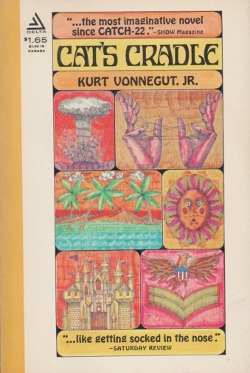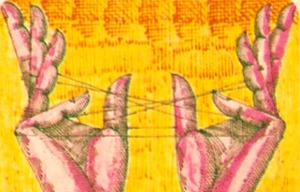Dark comedy is one of the more perverse pleasures in reading. For starters, you are invariably laughing at great misfortune, very often at events that, if they were not in a comedy, would register a ten on the Richter scale of human tragedy. And if that were not enough to label you a bit of a sick puppy, consider that the protagonist is nearly always an everyman. The heaps of calamity poured upon the main character, and the insane world in which he lives, are mirrors of ourselves and our society. So it should be no surprise that after all the laughter and chuckling subside, the reader is left with an unsettling feeling – a great comic hangover.
 Perhaps no other author, in or out of the SF genre, was a greater master of this form than Kurt Vonnegut. Cat’s Cradle, Vonnegut’s fourth novel, is a horrifically hilarious example of his mastery of dark comedy. Published in 1963 and nominated for the 1964 Hugo Award, the novel appeared close on the heels of the Cuban Missile Crisis – an event which likely influenced some of the particulars of the story. The story itself, however, is by no means dated. Cat’s Cradle will remain relevant for as long as there are… well, for as long as there are flawed humans.
Perhaps no other author, in or out of the SF genre, was a greater master of this form than Kurt Vonnegut. Cat’s Cradle, Vonnegut’s fourth novel, is a horrifically hilarious example of his mastery of dark comedy. Published in 1963 and nominated for the 1964 Hugo Award, the novel appeared close on the heels of the Cuban Missile Crisis – an event which likely influenced some of the particulars of the story. The story itself, however, is by no means dated. Cat’s Cradle will remain relevant for as long as there are… well, for as long as there are flawed humans.
The story is told in retrospect via short, clipped chapters through the eyes of John (last name never given), who requests at the start that you “Call me Jonah.” It is his way of signaling that he is fated to play his part in the disastrous events that follow.
The unfathomable nature and cruelty of fate is one of the central themes of the book, and is put forward playfully through the device of a fictional religion invented by one of the main characters who goes by the name Bokonon. Throughout the book the reader is presented with wry observations from his Books of Bokonon, like “Peculiar travel suggestions are dancing lessons from god” and “History! Read it and weep!”
John, or Jonah, initially sets out to research a book he is writing about the day the atomic bomb was dropped on Hiroshima, titled The Day the World Ended. Through a series of interviews he is conducting we are introduced to the members of his karass, a term that Bokonon describes as “teams that do God’s Will without ever discovering what they are doing.” One of the members of John’s karass is the deceased Dr. Felix Hoenikker, a brilliant scientist with a near total apathy for people. He was one of the (fictional) principle architects of the atom bomb and the inventor of a form of water called ice-nine. Ice-nine is essentially a way of stacking Hydrogen and Oxygen atoms together in such a way that the freezing point of water becomes 114.4 degrees Fahrenheit. Hoenikker got the idea for ice-nine when he was asked by a Marine General to get rid of mud because, “The Marines, after almost two-hundred years of wallowing in mud, were sick of it.”
At the time of Hoenikker’s death, only his three children were aware that the scientist had actually managed to create the stuff. So the children split the ice-nine among themselves, each getting a piece that could act as a catalyst to teach, so to speak, regular water molecules how to stack together like ice-nine. One of Hoenikker’s children, Frank, uses his portion to get himself elevated to Major General by the dictator of a small Caribbean island nation called The Republic of San Lorenzo.
 “As it happened – ‘as it was meant to happen,’ Bokonon would say,” all the principle living characters gather in San Lorenzo where the elements of the story come together in a hysterically funny apocalypse which I will not spoil for you by describing here.
“As it happened – ‘as it was meant to happen,’ Bokonon would say,” all the principle living characters gather in San Lorenzo where the elements of the story come together in a hysterically funny apocalypse which I will not spoil for you by describing here.
There is an interesting passage in Cat’s Cradle where you get a glimpse of Vonnegut’s view of the role of the writer in society. John is momentarily mistaken for a drug salesman by a man who hopes that he might be bringing aspirin to the local hospital to help relieve the pain of island natives. “I’m not a drug salesman. I’m a writer,” John says. To which the other man replies, “What makes you think a writer isn’t a drug salesmen?” Dark comedy is a drug intended to help ease the pain of the hopelessness we sometimes feel in tragic situations that are beyond our control.
Mind you, aspirin upsets some peoples’ stomachs, so too, Cat’s Cradle is not for everyone. Some people will cry in reaction to the story rather than laugh. I do not recommend the story for children, or for the idealist who has never had a taste of hopelessness. And it is especially not for the overly serious who think that there are some subjects too serious to joke about.










